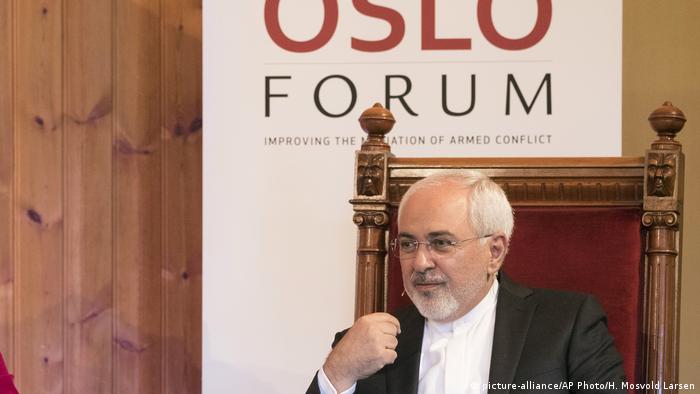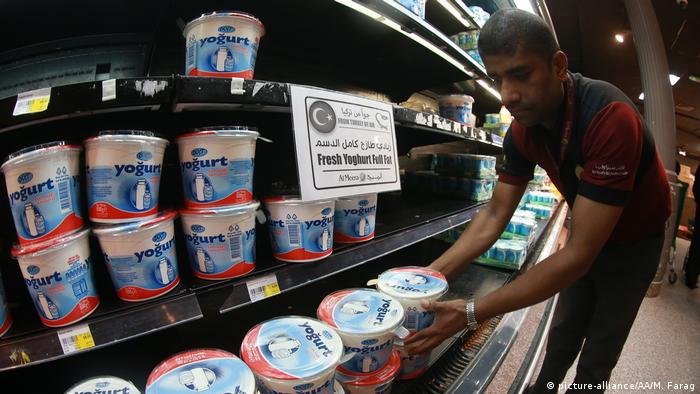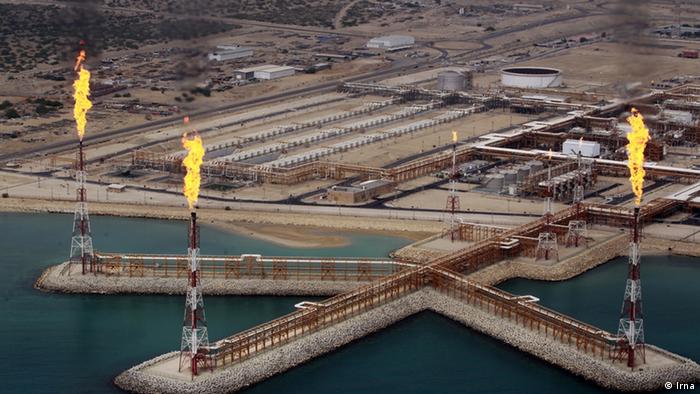The Qatar-crisis has been sparked, among other things, the relations of the Emirate to Iran. However, despite a rapprochement between the two Gulf States in the last time Iran behaves in this matter, remarkably restrained.

Iran’s foreign Minister Zarif (in Oslo): warning of further tensions
“The Situation in the Gulf region is very unpredictable. We don’t need another riot,” said Iran’s foreign Minister Mohammad Javad Zarif on Monday on the sidelines of the forum “peace in the new Era of geopolitics” in Oslo. In an Interview with the English-language Iranian channel “Press TV”, warned Sarif from further tensions, which could lead to a Disaster. All Iranian media are reporting very cautious about the Qatar-crisis. May be an indication that in Tehran, the fear of a new war in the Persian Gulf is apparently large.
The reason is that in the Middle of the Ramadan, the Holy month of the Muslims, had at the beginning of last week, several Arab countries imposed, under the leadership of Saudi Arabia, a Blockade against Qatar. They accuse the Emirate, among other things, to support terrorist groups financially. Therefore, the country has closed border for the Peninsula on which Qatar is located; flight connections from Arab States in the capital city of Doha are interrupted. This way no goods will come now more into the country, which is almost completely dependent on drinking water and food imports.
Shortly after the beginning of the embargo, an Iranian trade Association registered with the offer to jump into the breach: “No Problem! We can provide Qatar within twelve hours,” said the Association of exporters of agricultural Products in Tehran. Nevertheless, Iran has had the time to provide the neighbors on the opposite side of Gulf shores. Only a week after the start of the crisis five planes to Qatar. The machines have brought 90 tons of fresh food, mainly fruits and vegetables in the Emirate.

Supermarket in Doha: shelves are stocked with Turkish products
“The Situation is very delicate. The reform-oriented government in Tehran behaves, therefore, be very careful,” says Iran expert at the Hessischer Rundfunk, Ali Sadrzade. “This first delivery to Qatar was also a symbolic act,” since the supermarket shelves in Qatar, were already re-populated with Turkish products.
The trigger for the crisis, Qatar: an Iran-friendly statement
The Shiite-embossed Iran seems to have little interest in the dispute between the Sunni Royal houses of the Persian Gulf to interfere. Perhaps, because of a fake message on the Qatar-Iranian relationship as a trigger for the crisis -: according to Emir Tamim bin Hamad Al Thani is said to have Iran as an “Islamic Power” and “enmity with Iran as a futile”. A No-Go for Tehran’s arch-enemies in the Saudi capital, Riyadh.
Various States offered to mediate in the conflict between the Gulf Emirate of Qatar and its neighbours. Also, the government in Tehran for a diplomatic solution. The Iranian left the Ministry of foreign Affairs announced that chief diplomat Zarif was in close contact with his colleagues in Turkey, Oman, and Kuwait to discuss the crisis in Qatar. He seems to know, why is Saudi Arabia so irritated.
Although Iran could friendly statements made by Qatar’s ruler Tamim Hamad Al Thani, was indeed a fake – a friendly phone call with Iran’s President, Hassan Rohani, it was not. The Emir had immediately after the Iran-critical speech of US President Donald Trump in Riyadh on 21. May, congratulates the reform-oriented Iranian President Hassan Rouhani, whose re-election. Thus, Qatar was care, a day after Saudi Arabia with Trumps had announced support a Front against Iran’s influence in the Region, from this Front.

Emir Tamim bin Hamad al-Thani: Conciliatory attitude
The Emir of Qatar is said to have stressed in his phone call with the Iranian President that the current problems could only be through talks and negotiations. This conciliatory attitude has obviously led to the fact that the relations of Qatar to Saudi Arabia are now significantly impacted.
The relationship between Iran and Saudi Arabia is strained after Iran’s Islamic Revolution of 1979. Iran sees itself as protecting the Shiites, Saudi Arabia as a protecting power the Sunnis. They compete in several Arab States for influence: In the Syria conflict, the leadership in Tehran, President Bashar al-Assad supported the Royal house in Riyadh, however, the armed Opposition. In Yemen, in turn, Saudi Arabia is waging a war against the Houthi rebels, which it considers to be the puppets of Tehran.
Iran and Qatar and a proxy war in Syria
In spite of their alleged approach no relationship of trust between Qatar and Iran, but there is still. The two States have a 250-Kilometer-long common Maritime border. The two Gulf residents share the largest discovered gas field in the world: “South Pars”. This gave rise to the dispute: As Iran because of its disputed nuclear program under wide-ranging sanctions to date and are therefore the promotion has slowed, an exploitation of Qatar, the South Pars Gas short-hand alone.
Both States also have different ideas with regard to the Transport of the energy carrier: Qatar wants to could be forwarded to a Pipeline that runs from the development area through Saudi Arabia, Jordan and Syria to Turkey, from where the Gas to Europe. In Tehran, you dream, however, has long been a Pipeline from Iran through Iraq and Syria to the Mediterranean.

South-Pars gas field to exploitation and Pipelines
Five years ago, Iran has an agreement with the Syrian ruler Assad closed. Implemented the ten billion dollar project in the civil war, the country could not be, however.
In addition, the two neighbors are also in the Syria conflict on different sides: as well as Saudi Arabia, Qatar supports the rebels.
And so, a greater involvement of Iran in the current Qatar could be a crisis rather counterproductive. Which is why the leadership in Doha on support from Tehran probably will not. “In the current crisis, Qatar’s will not rely on Iran,” the evaluation of the political scientist Sadegh Zibakalam of Tehran University. “Especially because you do not want to provoke Saudi Arabia. Qatar is trying to cope with this crisis with the help of Turkey or Pakistan.”
And the Iranian leadership will probably back for domestic political reasons: Otherwise powerful conservative circles, could get in Iran ascendant, which would mess with Saudi Arabia about the Iranian revolutionary guard.